Q&A with Katherine Quinteros
PhD student in Social Psychology
Interviewed by: Darío León, Research and Community Coordinator
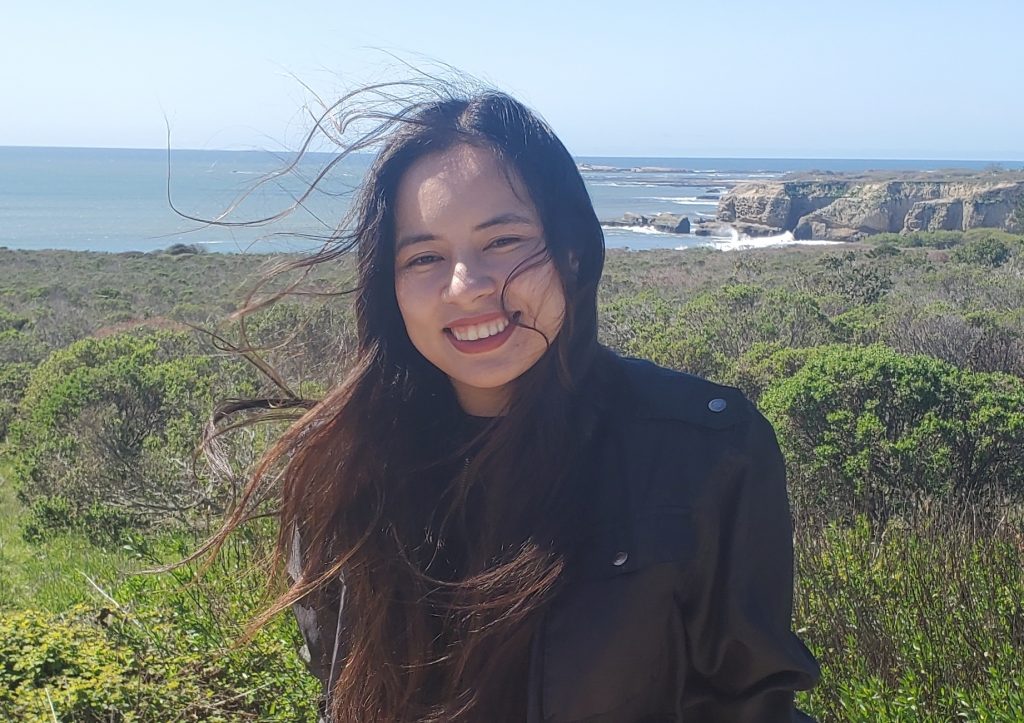
Katherine Quinteros, a second-year Ph.D. student in Social Psychology who received the Chancellor’s Graduate Internship/Campus Fellow Award for Building Belonging Through Researcher-Practitioner Collaboration and winner of the Graduate Research Symposium Best of the Social Sciences Division Award. Using critical frameworks, her research examines the experiences, challenges, and strengths of minoritized groups in higher education. She is also a graduate student leader at the UC Santa Cruz Collaborative Research for Equity in Action (CREA) lab. Katherine’s work evaluating the Building Belonging program has helped identify essential key levers of change that influence university belonging, and potentially retention, for minoritized students.
So what brought you to UC Santa Cruz?
I would say it started when I was five years old. My mom was always telling me “you’re going to get a PhD, you’re going to get a PhD” and it’s not that she knew what that meant, she just knew it would open doors for me. I always knew that growing up, so to start my journey, I attended Pierce Community College in Southern California. I went to Pierce College with no real idea as far as what I was going to do. I met an amazing professor, James McKeever, who was very much into activism, being a part of the struggle, and he infused that into the sociology class he was teaching. He was the first one to break down what a PhD was, provide essential information about the process and especially on how to pay for it. He really pushed me to take certain courses and even through conversation he would give me advice. I remember when I was admitted into UCLA I was scared and a bit hesitant; I didn’t know if I could leave my family. Even though it wasn’t very far from my home, it was still a new journey. He kept pushing me to do it and to give myself this opportunity. It was tough, especially coming from the semester system to the quarter system as a transfer student was rough for me. I graduated from UCLA and took a year off. I started working at Pierce College in the student success office during that year. I felt close to the community there and I learned a lot working with students and learning about their struggles. I related to them since we shared similar backgrounds and had many of the same issues with uncertainties and nerves about transferring to a four year college and all that comes with that process.
I had been looking at places to attend graduate school and it was during my senior year that I read a bit of research that Dr. Rebecca Covarrubias had written; it stood out to me and was relatable. She talked about first generation college students, Latino students and other topics that felt so similar to what I was going through. That’s when I got excited because I realized I could do research on topics that were very close to home for me. So I reached out to her and I came to visit UC Santa Cruz, even before applying, because I wanted to meet her. From the get-go she was great, she was so welcoming and so warm. I got to meet women who are now my lab sisters and got to feel what it was like to be in a space of just women of color. I decided to take a year off and when I told her my plan, she was incredibly supportive and that’s when I realized that she really understood where I was coming from. She’s great and I felt welcomed in her lab, in her space and her being a woman of color made it easy to connect with her. I actually felt as if I could ask her questions and get validation and feedback which is not what you usually get with professors in general. What brought me here was seeing such a strong woman of color, and other strong women of color, being able to excel in their profession and in life.
How were you first exposed to Professor Rebecca Covarrubias’s work?
I was in a program at UCLA that offered resources and research opportunities to minoritized students along with stipends; which was central to me because I was also working full time while I was doing my undergrad. After being advised to look into people’s research and grad school programs, I typed into the library search engine something like, “first generation Latino students,” and found and read articles by her that really caught my attention. She would discuss topics such as the guilt and emotional strain minoritized students go through in education, knowing it’s an opportunity that not everyone gets in our communities and along with other factors that we carry with us. Coming from an interdependent culture and walking into an independent thinking type of system and maneuvering in that system can be stressful. Her work stood out to me and it showed me that she was a person who really gets it and understands that it’s a rough path. I saw that she was at UC Santa Cruz. To be honest, I didn’t know where UC Santa Cruz was and when I found out I thought it was so far from LA. So I reached out to her and I was surprised that she replied so quickly. She was very open and discussed the work she was doing and told me to contact her if I ever wanted to chat. She was always accessible in ways that I had never experienced with other faculty or professors at UCLA or elsewhere.
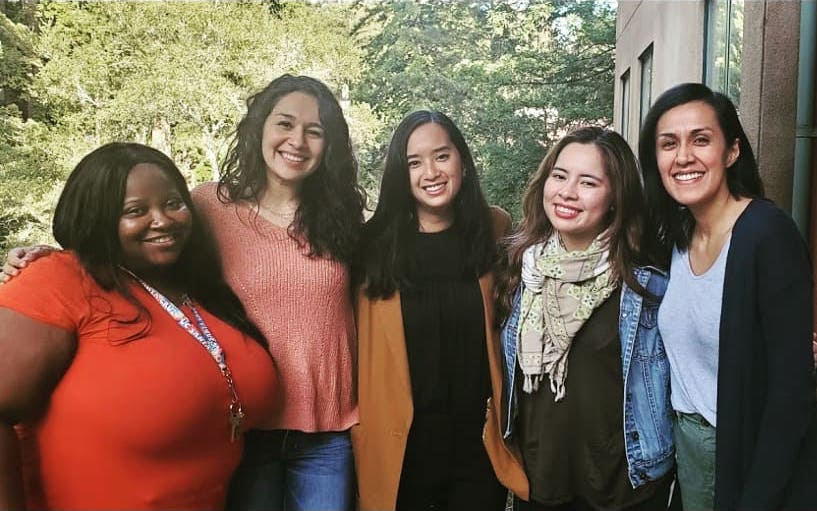
Can you talk a little bit about the work you’ve been doing with Professor Covarrubias?
Part of that work has been with the Building Belonging program but before that we were working on a project that focused on faculty of color and their experiences with formal leadership. We were trying to understand how entrenched structures like whiteness, white supremacy and racism impacts faculty of color in their experiences as well as their resilience and how they respond. Becca has been really good at finding opportunities and involving us in the lab. She realized that mentoring was something that has been pivotal to my own experience and asked me if I wanted to do this work with her on the Building Belonging program. There were many reasons why I was so excited. First, I get to work with her and that’s always great. Second, since mentors and mentoring has been critical in my own experiences, I was able to see, through the program evaluation, how students value that experience as well as how proud, supportive and encouraging faculty are towards their students. Seeing that relationship between faculty and students has been great because at times you don’t see the faculty side in this type of work. Seeing a complete picture of the program and how that interaction and relationship form and exist has been amazing. It’s also nice to get out of your reading and assignment bubble, no matter how comfortable you might be, and be able to see different pieces and how they all come together to impact student experiences in trying to make them better and trying to take out obstacles and barriers. When you get to see all these pieces working together, you value the people who are in those positions that are helping students.
Can you share some perspectives that you’ve learned from your evaluation of the Building Belonging program?
Since we’ve been doing this work during COVID-19, one thing I’ve noticed is the value students have in connecting with faculty, even if it’s through Zoom. They are happy to have someone they can work with and have their research, perspective, and effort feel valued. I think that it’s great to see that students want and are longing for that in-person interaction; they want a community. It is students seeing the value in themselves and feeling like their thoughts and opinions matter and it’s these experiences that help them think about how they can help their communities, how they can make sure their communities are heard and what research methods they could use so that they’re giving their community a voice. Professors help in getting them thinking about what projects they want to do in the future in their own communities and it gets them excited about research. It’s great to see because research can seem abstract, but being able to break it down and learn the difficulties and the intricate pieces that have to come together in order to make things work is amazing.
I’ve also learned the importance of having a stipend for students. Coming from backgrounds similar to mine, I understand the importance of stipends in helping reduce some of the responsibilities and burdens that students have in their lives, even more so during this pandemic. The situation is critical for students, to the point that they might not have been able to participate in this program if they didn’t have that financial support.
Has anything surprised you, or stood out, on your evaluation research?
Research, at times, can seem detached from community and the nitty-gritty of everyday life but working with Becca has shown us that there are ways to create impact and work collectively with other programs to bring about change. She asks, how are we going to actually use this research so it doesn’t stay in some academic journal or tucked away someplace? How do we use what we’ve learned to implement change that will help minoritized communities rather than publishing something and hoping someone reads it, hoping someone changes policy and hoping someone uses this information?
In her lab, the focus is using research to create change now. She’s challenging the ways of thinking about tangible and fundamentals so that we can implement change or advocate for it. With the Building Belonging program, it’s about using what we’re learning now to make sure that the program is still meeting the goals of bringing a sense of belonging to students, telling them that they matter, and making sure they’re getting great mentoring that’s actually helping them rather than them just participating in a program.
Looking into the future, what are some goals for your research?
I’ve always wanted to do things that I’m proud of. I’ve had a few mentors along the way who’ve been essential in my development. I’ve had mentors advise me that once you start moving up into certain positions, don’t forget the things that you’ve gone through, don’t forget where you came from and I’ve always carried that. I always keep in mind this idea of social change and making things better, or at least trying to; this is a fight and you have to keep going. I’ve been able to see how research can be utilized in a faculty position as well as in other institutions and the multiple paths you can take to reach your goal.
I’ve been able to learn a lot from faculty in the Social Science Division. They all have so many different focuses in their work and they’re all creating different impacts. I feel like they’ve raised the bar on how to bring about change and it’s made me think about how I am going to continue on this great legacy. At the heart of it all, wherever I go, I have to make sure that the work and the fight are part of my ideology and not forget that there’s still so much to do. There is still work that has to be done in a lot of different ways, the trick is figuring out where I will be the most useful and how will the work that I do help people.


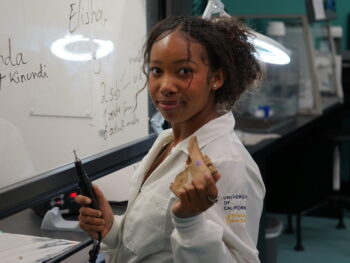
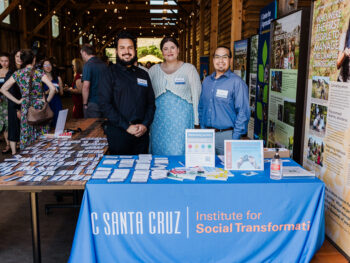
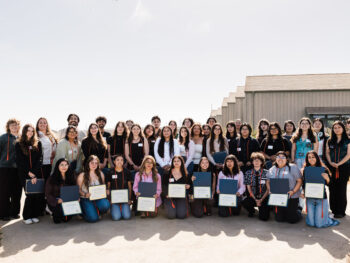
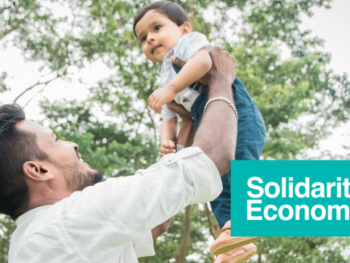
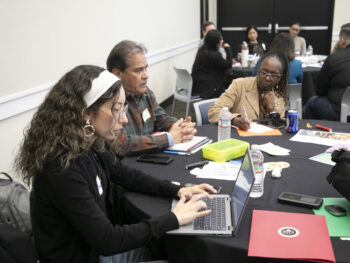
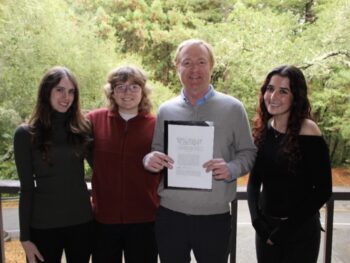
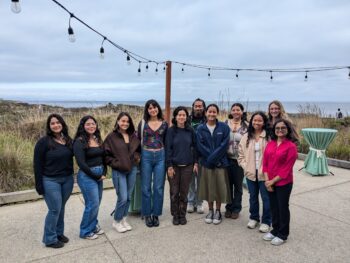
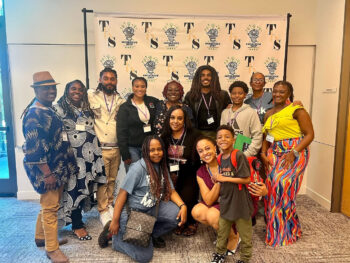
 Building Belonging Student Showcase 2022
Building Belonging Student Showcase 2022
